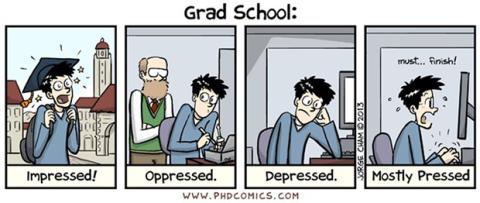Embarking on your graduate career can be exciting. You’re designing your own experiments, directing your own scientific inquiry, uncovering new knowledge. There’s so much to learn! It also comes with a unique set of challenges. There is a lack of structure – there’s no set end time, and the milestones along the way aren’t rigidly defined and often depend on you. You’re expected to work more independently than you have in the past. In addition, you may receive infrequent feedback on your work, and what you do hear is often critical.

As postbacs prepare to apply for graduate school, many might be coming to you to ask for a letter of recommendation. It can be hard to know how to start these all-important letters, so here are some things to keep in mind as you draft your reference letter.
As noted in last week’s blog about reapplying to medical school, deciding to reapply for graduate programs naturally brings mixed feelings. You should be congratulated for the investment of time, effort, and expense that all applicants invest during the application process. For those of you who are on waitlists for admission this cycle, there is still a possibility for matr
It is that time of year when many of you are preparing to apply to doctoral programs in the sciences. You may be asking yourself:
- Where do I apply?
- What strategies will I use to decide between programs?
- What are the best programs for me?
Here are several suggestions to simplify the process provided by Dr. Bill Higgins, Pre-Professional Consultant in NIH’s Office of Intramural Training and Education (OITE).
One of the most challenging questions that developing scientists must answer is, “Should I pursue an academic or industry career?” For some, the pursuit of an academic career is their path of choice.

A few weeks ago, OITE hosted NIH’s Graduate & Professional School Fair. One of the sessions focused on MD/PhD programs and how to decide whether it is the right program for you. If you missed it, the presentation can be found online.

First, take solace in the fact that you aren’t alone. According to the AAMC, there were over 48,000 medical school applicants in 2013. From that pool of applicants, less than half of them (20,055) matriculated into their first year of medical school.
Secondly, be heartened by recent reports like the one just released in March 2015, “The Complexities of Physician Supply and Demand: Projections from 2013 to 2025.”
If you are a prospective PhD student, you will probably be spending these next couple of weeks putting the finishing touches on your graduate school applications. With looming deadlines for fall admission, the majority of applications will be due in December or January. Now might be a good time to read a research article from Teaching of Psychology (Appleby & Appleby, 2006). In this qualitative study, chairs of admissions committees were asked to provide detailed examples of “kisses of death” they had encountered when reviewing a candidate’s application materials.
Have you ever taken to the task of trying to put on paper what is special, unique, distinctive and impressive about you and your life story? Well, if you are applying to graduate and/or medical school, you soon will in the form of a personal statement.

